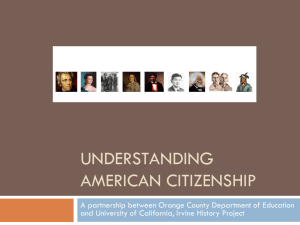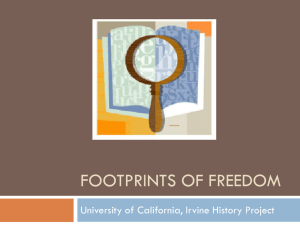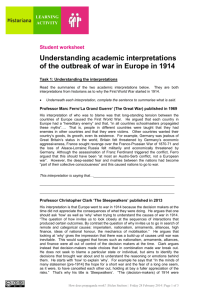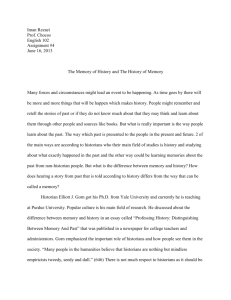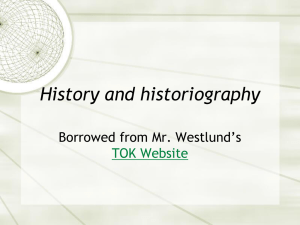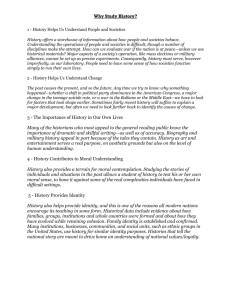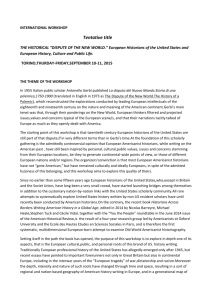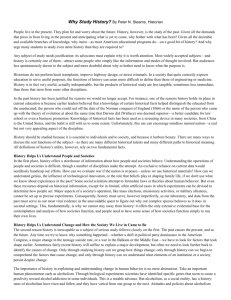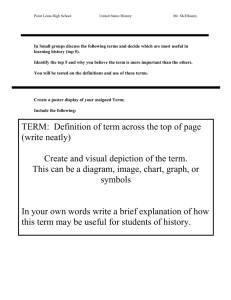History 200 Historians Blog #1
advertisement
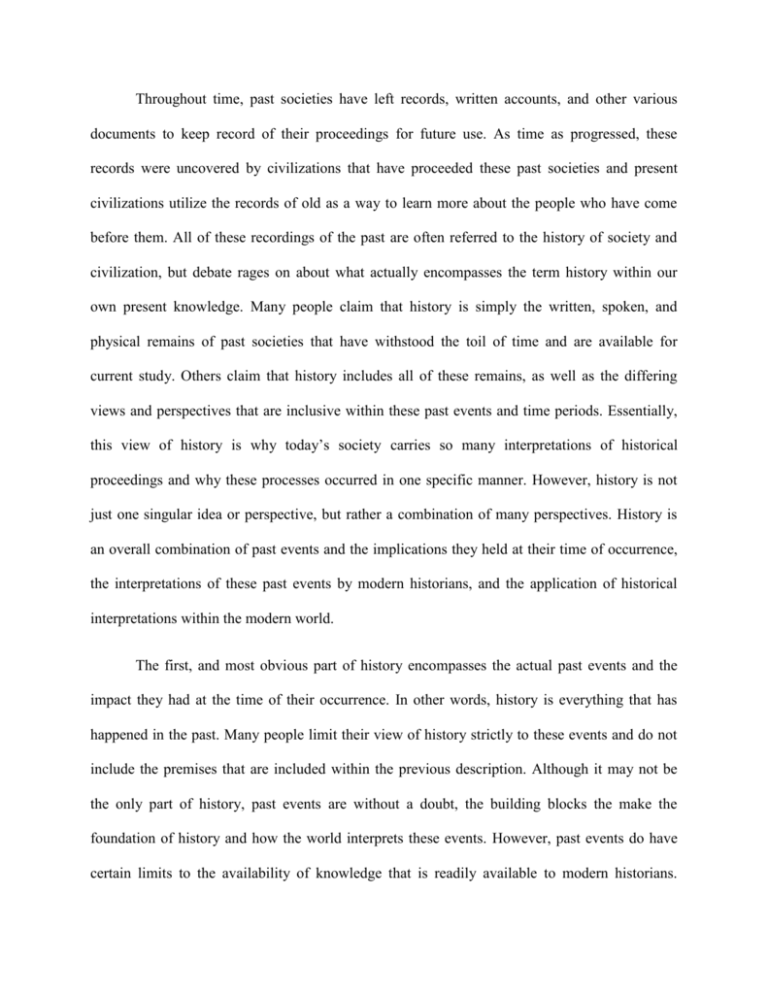
Throughout time, past societies have left records, written accounts, and other various documents to keep record of their proceedings for future use. As time as progressed, these records were uncovered by civilizations that have proceeded these past societies and present civilizations utilize the records of old as a way to learn more about the people who have come before them. All of these recordings of the past are often referred to the history of society and civilization, but debate rages on about what actually encompasses the term history within our own present knowledge. Many people claim that history is simply the written, spoken, and physical remains of past societies that have withstood the toil of time and are available for current study. Others claim that history includes all of these remains, as well as the differing views and perspectives that are inclusive within these past events and time periods. Essentially, this view of history is why today’s society carries so many interpretations of historical proceedings and why these processes occurred in one specific manner. However, history is not just one singular idea or perspective, but rather a combination of many perspectives. History is an overall combination of past events and the implications they held at their time of occurrence, the interpretations of these past events by modern historians, and the application of historical interpretations within the modern world. The first, and most obvious part of history encompasses the actual past events and the impact they had at the time of their occurrence. In other words, history is everything that has happened in the past. Many people limit their view of history strictly to these events and do not include the premises that are included within the previous description. Although it may not be the only part of history, past events are without a doubt, the building blocks the make the foundation of history and how the world interprets these events. However, past events do have certain limits to the availability of knowledge that is readily available to modern historians. Unfortunately for these historians, the past events that make up the definition of history are limited “to the quantity and quality of available evidence.” (Galgano 3). In other words, history is limited to what is concretely known about these past events, whether the evidence is in the form of oral recordings or written documents. In these limitations, speculations often find their way into many historical findings and interpretations. Without being based on historical evidence, any speculations made about past occurrences are just a misuse of the definition of history. In order for any past event to be considered truly a part of history, it must be based on solid evidence that clearly describes these events, with any speculations being based off of further historical evidence. In summation, the basis for all history comes from past events that have occurred and are recorded in some form and has evidence existing to confirm the occurrence of such events. Secondly, a major part of history is the interpretation of past events by modern day historians. Through the discerning and sorting through of past events and the knowledge held about these occurrences, historians are able to interpret past events on the basis of why and how events occurred, as well as the implications these events held for future societies and civilizations. While the past events themselves serve as the building blocks of history, present day interpretations of these events are the framework that shapes history. Understanding why and how events occurred in the past is an essential portion of history, because it helps present historians fit the pieces of the puzzles of the past together. Knowing the motives behind events allows historians to follow and analyze history from one event to the next, which in turn gives us a clearer picture of past life. However, it is through these interpretations that the major differences amongst historians come from. Historians constantly hold differing views and opinions for the reasons and implications of past events, which in turn leads to massive debates within the study of history. All of these differing viewpoints are essentially the reason that there is not one massive history book, but instead thousands of history books that all offer their own unique interpretation of past events. Yet, these interpretations are were many of the problems with history come into play within the inability to properly analyze past evidence from historical events. One of the major problems with historical interpretation is presentism, which is when historians place modern day beliefs and values into their interpretation of past societies (Galgano 4). Through this, historians do not take into account the proper historical context of a certain time period, which can lead to many invalid analyses and interpretations. In order for any particular historical interpretation to hold any validity, the historian must keep into perspective the specific customs of past civilizations and the point of view in which these events occurred. In summation, the overall interpretations, opinions, and viewpoints amongst historians as to why and how events transpired in the past is an essential foundation to the true definition of history. Finally, the last major component of history is the modern day application of the interpretations made upon past events. In essence, modern day society must utilize the experiences and understandings of the past in order to help make a better present and future for society. The definition of insanity is repeating a process over and over, while expecting different results, yet by application of past knowledge, society hopes to avoid this calamity. Essentially, by applying the knowledge of the past to the present, society learns from the mistakes of the past in order to avoid repeating them in the future. In addition to helping prevent the repetition of past mistakes, applying interpretations to modern life also helps society learn from the achievements of the past to better society for the present and future. One such example comes from our very own Declaration of Independence and United States Constitution. The founding fathers of America essentially had no original or unique ideas that they applied to building their new nation’s governmental infrastructure. Instead, the founding fathers used the ideas of democracy from Ancient Greek civilizations and ideas from past philosophers such as John Locke. Modern day society is build around the application and utilization of values, principles, ideas, and teachings of the past, just adapted to fit our modern system. Through the application of historical interpretations of the past, society has built a world that has laid its foundations and structure amongst the teachings of the past. In summation, the application of the understandings of past events is the final piece of the true definition of history. In conclusion, history is contained within three major components: past events that helped shape future events, the interpretations and analyses of these events by modern historians, and the application of these interpretations by society on the modern day world. These three portions of history are all interconnected and woven together to help create the very basis for present day life and without one piece of this triangle, society would crumble. History is essential to the preservation of all parts of time, the past, present, and future. The definition of insanity is repeating the same process over and over, while expecting different results. With the proper understanding, interpretation, and application, history will continue to be the driving force of sanity within our society.
